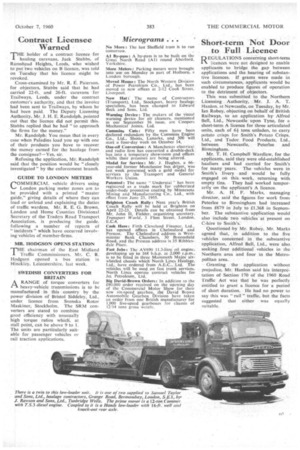Short-term Not Door to Full Licence
Page 53

If you've noticed an error in this article please click here to report it so we can fix it.
ulEGULATIONS concerning short-terrn I licences were not designed to enable applicants to bridge the gap between applications and the hearing of substantive licences. . If grants were made in such circumstances, applicants would be enabled to produce figures of operation to the detriment of objectors.
This was submitted to the Northern Licensing Authority, Mr. J. A. T. Hanlon, at Newcastle, on Tuesday, by Mr. Ian Robey, objecting on behalf of British Railways, to an application by Alfred Bell, Ltd., Newcastle upon Tyne, for a short-term A licence for three articulated units, each of 61 tons unladen, to carry potato crisps for Smith's Potato Crisps, Ltd., and Tudor Food Products, Ltd., between. Newcastle, Peterlee and Birmingham.
Mr. T. 1+ Campbell Warcllaw, for the applicants, said they were old-established hauliers and had carried for Smith's for many years. The vehicles were in Smith's livery and. would be fully engaged on this work, returning with empty tins. They had worked temporarily on the applicant's A licence.
Mr. A. H. F. Marks, managing direCtor, said the figures for work from Peterlee to Birmingham had increased from £679 in July to £1,368 in September. The substantive application would also include two vehicles at present on e-hire to Smith's.
Questioned by Mr. Robey, Mr. Marks agreed that, in addition to the five vehicles concerned in the substantive application, Alfred Bell, Ltd., were also seeking four additional vehicles in the Northern area and four in the • Metropolitan area.
Granting the application without prejudice, Mr. Hanlon said his interpretation of Section 170 of the 1960 Road Traffic Act was that he was perfectly entitled to grant a licence for a period of short duration. He had no power to say this was " rail " traffic, but the facts suggested that either was equally suitable.
































































































































